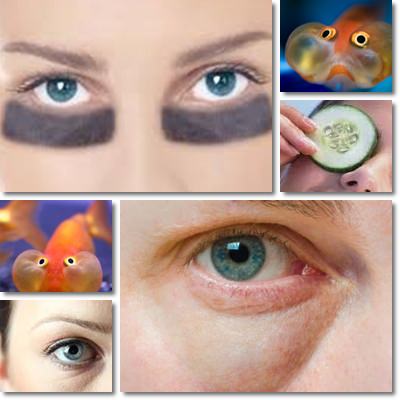Puffy eyes and dark circles under the eyes are two issues many people face nowadays. Though men are affected too, women have found it harder to deal with the cosmetic impact of puffy, baggy eyes because of social expectations requiring them to be the epitome of perfection.
Though stress and sleeplessness are common causes for puffy eyes and dark circles, the conditions may indicate the existence of an underlying health problem.
So what are puffy eyes and dark circles more exactly? Puffy eyes, also known as periorbital puffiness, swelling around the eyes, baggy eyes or periorbital edema is swelling around the eye area. Dark circles under the eyes or periorbital dark circles refer to a darker skin under the eyes, often with blue, violet or brown hues. Both conditions can be triggered by a variety of medical problems or they can have benign causes that resolve themselves with time and attention.

The skin under our eyes is visibly thin and quite delicate. For this reason, it requires a lot of care and a slightly different beauty routine than that we normally employ for the rest of our face. And because it is so delicate, it is generally the first to show signs something is not right.
Bad dietary and lifestyle choices can, in time, engender nutrient deficiencies, cause inflammation or the skin to deteriorate. A lack of several important nutrients such as potassium, vitamins A, E or C, food or seasonal allergies, damaging the skin by rubbing it excessively or sun tanning too much as well as genetics can all have a serious impact on the health and appearance of your skin. And the result is puffy eyes and dark circles.
What causes eye puffiness?
The first step in finding the best solutions for counteracting eye puffiness is knowing what causes it.
So here are 10 of the most common causes for puffy, baggy eyes:
1) Not getting enough sleep
Sleep deprivation, though for a good cause, will leave a mark on our health. Fatigue, concentration problems, fainting and even puffy eyes are all common symptoms of lack of sleep. In some cases, sleeping too much can result in visible, but temporary puffiness around the eyes.
2) Water retention
Although it most often manifests through bloating, fluid or water retention can also cause face puffiness and make any existing swelling around the eyes worse, resulting in big, baggy eyes or more prominent-looking dark circles.
3) Bad dietary choices
Having too much sodium in our diet can encourage fluid retention which, in turn, may increase the swelling around our eyes and worsen their puffy aspect. Limiting salt intake is pivotal for preventing water retention.
Also, make sure your are getting enough potassium to help you balance the effects of sodium in our body.

4) Food and seasonal allergies, sinus problems
Both can easily cause puffiness around the eyes because they elicit an abnormally strong immune system response that involves inflammation or swelling. Rhinitis or allergic rhinitis can cause nasal congestion, itching, sneezing and eye swelling, among the most common symptoms.
5) Crying
We all know that crying for even several minutes can make all our face red and swollen, eyes included. Generally, this puffiness will resolve itself shortly after we stop crying.
6) Stress
Though the mechanisms are complex, stress is known to alter our appearance in an incredibly manner. Signs of chronic stress may include significant weight loss, sleep problems, dry or watery eyes and eye puffiness.
7) Smoking and drinking alcohol
If excessive, both contribute to premature skin aging and edema and result in puffy, baggy eyes.
8) Aging
It is important to take really good care of ourselves in the sense that we should sleep as much as our body requires us to, eat healthy and include a lot of fresh fruits and vegetables in our diet, exercise a little and limit smoking, drinking and our exposure to pollution.
9) Genetics
For some people, having puffy eyes is a matter of genetics. Bags under the eyes can be seen in children as young as 2 or 5 years old who inherit these traits from a family member such as mother or father with particularly prominent puffy eyes.
The older they get, the more visible their aspect gets.
10) Other problems
Skin disorders such as dermatitis may cause the skin under the eyes to swell visibly. Thyroid problems (both hyperthyroidism and hypothyroidism), kidney disorders causing edema, tear gland problems or even intestinal parasites infestations (trichinosis, Chagas disease) may cause puffy, baggy eyes.
What causes dark circles under eyes?
While many people only have puffy eyes to deal with, others have to worry about dark circles as well.
Here is a list of 10 potential causes of dark circles under the eyes:
1) Genetics.
2) Sleep deprivation.
3) Skin problems (eczema).
4) Food or seasonal allergies.
5) Aging.
6) Anemia.
7) Low body weight.
8) Pigmentation problems.
9) Medicines causing blood vessel dilation.
10) Eye infections.
Eyes tend to be puffier in the morning because there is little to no movement of the eyelids during the night. This may engender a little fluid retention, but the puffiness usually diminishes in about an hour after waking up.
Similarly, dark circles may get worse if we don’t sleep enough or bruise the lower part of the eye by using rough eye pencils or rubbing our eyes hard, for example.
Treatment and solutions Puffy Eyes
Treatment options vary immensely depending on what causes the puffiness and dark circles. If inherited, puffy eyes and dark circles will be yours for the keeping.
Although invasive surgery, chemical peels or laser procedures are effective solutions to improve the puffy, baggy eye aspect and dark circles. Temporary remedies with just as temporary effects are also available.
Here is a comprehensive list of aspects to consider if you want to improve eye puffiness and dark circles:
1) Keep hydrated by drinking sufficient water.
2) Rest and eat right.
3) Wear sunscreen when exposing yourself to direct sunlight.
4) Reduce salt intake.
5) Eat potassium-rich foods such as bananas or potatoes to combat water retention and swelling.
6) Limit stress.
7) Apply cold tea bags over the eyes and keep for 10-15 minutes.
8) Apply cold cucumber slices for 10-15 minutes to reinvigorate the area below your eyes.
9) Take your vitamin C to strengthen blood vessels, improve skin aspect by increasing collagen production and reduce swelling
10) Eat vitamin E-rich foods such as nuts and seeds for a healthy, radiant skin.
11) Increase your intake of antioxidant rich foods such as berries, green tea, cocoa etc. to help combat premature aging.
12) Stop smoking.
13) Limit alcohol consumption.
14) Hydrate the eye area with adequate skin care products.
Avoid using hemorrhoid creams for the area under the eyes. These types of products can cause dangerous side effects such as inflammation or vision problems if they get into the eyes.
Also, avoid skin whitening products that contain dangerous chemical compounds (hydroquinone or mercury, for example). Preliminary research suggests they may have carcinogenic and toxic effects. In the end, it is best to love yourself for the wonderful person you are than risk your health for the sake of cosmetics.
